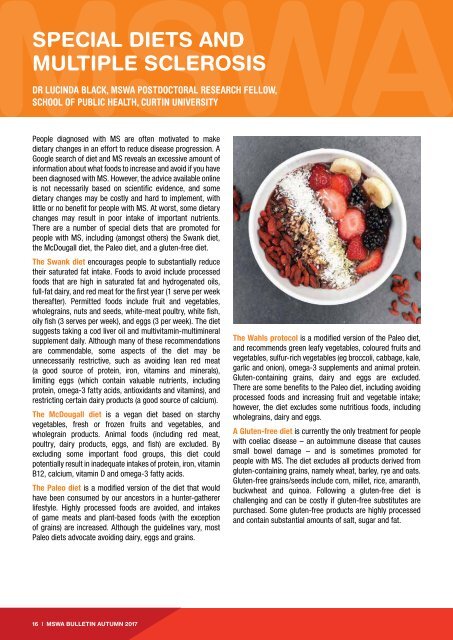MSWA Bulletin Magazine Autumn 17
You also want an ePaper? Increase the reach of your titles
YUMPU automatically turns print PDFs into web optimized ePapers that Google loves.
SPECIAL DIETS AND<br />
MULTIPLE SCLEROSIS<br />
DR LUCINDA BLACK, <strong>MSWA</strong> POSTDOCTORAL RESEARCH FELLOW,<br />
SCHOOL OF PUBLIC HEALTH, CURTIN UNIVERSITY<br />
People diagnosed with MS are often motivated to make<br />
dietary changes in an effort to reduce disease progression. A<br />
Google search of diet and MS reveals an excessive amount of<br />
information about what foods to increase and avoid if you have<br />
been diagnosed with MS. However, the advice available online<br />
is not necessarily based on scientific evidence, and some<br />
dietary changes may be costly and hard to implement, with<br />
little or no benefit for people with MS. At worst, some dietary<br />
changes may result in poor intake of important nutrients.<br />
There are a number of special diets that are promoted for<br />
people with MS, including (amongst others) the Swank diet,<br />
the McDougall diet, the Paleo diet, and a gluten-free diet.<br />
The Swank diet encourages people to substantially reduce<br />
their saturated fat intake. Foods to avoid include processed<br />
foods that are high in saturated fat and hydrogenated oils,<br />
full-fat dairy, and red meat for the first year (1 serve per week<br />
thereafter). Permitted foods include fruit and vegetables,<br />
wholegrains, nuts and seeds, white-meat poultry, white fish,<br />
oily fish (3 serves per week), and eggs (3 per week). The diet<br />
suggests taking a cod liver oil and multivitamin-multimineral<br />
supplement daily. Although many of these recommendations<br />
are commendable, some aspects of the diet may be<br />
unnecessarily restrictive, such as avoiding lean red meat<br />
(a good source of protein, iron, vitamins and minerals),<br />
limiting eggs (which contain valuable nutrients, including<br />
protein, omega-3 fatty acids, antioxidants and vitamins), and<br />
restricting certain dairy products (a good source of calcium).<br />
The McDougall diet is a vegan diet based on starchy<br />
vegetables, fresh or frozen fruits and vegetables, and<br />
wholegrain products. Animal foods (including red meat,<br />
poultry, dairy products, eggs, and fish) are excluded. By<br />
excluding some important food groups, this diet could<br />
potentially result in inadequate intakes of protein, iron, vitamin<br />
B12, calcium, vitamin D and omega-3 fatty acids.<br />
The Paleo diet is a modified version of the diet that would<br />
have been consumed by our ancestors in a hunter-gatherer<br />
lifestyle. Highly processed foods are avoided, and intakes<br />
of game meats and plant-based foods (with the exception<br />
of grains) are increased. Although the guidelines vary, most<br />
Paleo diets advocate avoiding dairy, eggs and grains.<br />
The Wahls protocol is a modified version of the Paleo diet,<br />
and recommends green leafy vegetables, coloured fruits and<br />
vegetables, sulfur-rich vegetables (eg broccoli, cabbage, kale,<br />
garlic and onion), omega-3 supplements and animal protein.<br />
Gluten-containing grains, dairy and eggs are excluded.<br />
There are some benefits to the Paleo diet, including avoiding<br />
processed foods and increasing fruit and vegetable intake;<br />
however, the diet excludes some nutritious foods, including<br />
wholegrains, dairy and eggs.<br />
A Gluten-free diet is currently the only treatment for people<br />
with coeliac disease – an autoimmune disease that causes<br />
small bowel damage – and is sometimes promoted for<br />
people with MS. The diet excludes all products derived from<br />
gluten-containing grains, namely wheat, barley, rye and oats.<br />
Gluten-free grains/seeds include corn, millet, rice, amaranth,<br />
buckwheat and quinoa. Following a gluten-free diet is<br />
challenging and can be costly if gluten-free substitutes are<br />
purchased. Some gluten-free products are highly processed<br />
and contain substantial amounts of salt, sugar and fat.<br />
16 | <strong>MSWA</strong> BULLETIN AUTUMN 20<strong>17</strong>


















